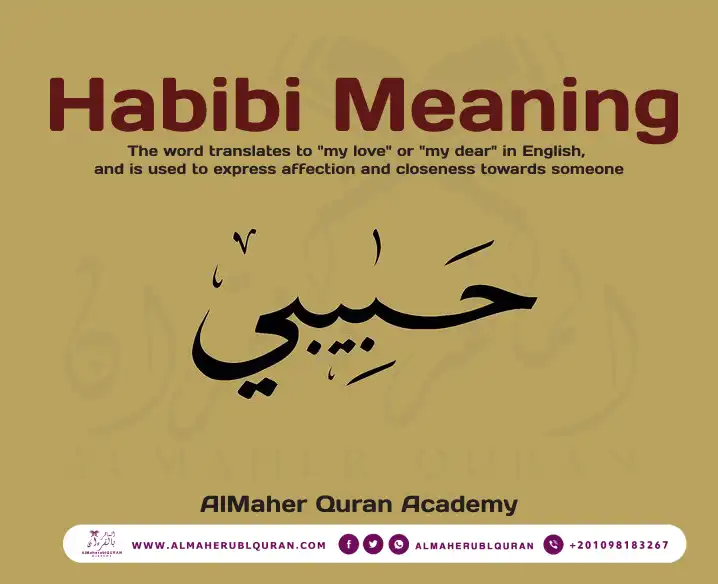Ever heard a word that instantly conjures images of warmth, affection, and cultural richness? "Habibi," a simple yet profoundly emotive term from the Arabic language, does precisely that, encapsulating a spectrum of feelings ranging from familial love to romantic endearment.
The beauty of "Habibi" lies in its versatility. It's more than just a word; it's a gesture, a feeling, a cultural touchstone. Understanding its nuances, its origins, and its appropriate usage unlocks a deeper appreciation for the Arabic language and the cultures it embodies. This exploration is essential for anyone seeking to connect with and understand the rich tapestry of human expression.
Let's delve into the multifaceted world of "Habibi," examining its linguistic roots, its diverse applications, and the cultural context that shapes its meaning. We'll navigate through the nuances of its usage, providing clarity and ensuring that you can incorporate this beautiful word into your vocabulary with confidence and respect.
- Danielle Bregoli Nude The Truth Behind The Clickbait And Sensationalism
- Lstg Meaning Unlocking The Hype And Craze Behind This Trending Term
At its core, "Habibi" (\u062d\u0628\u064a\u0628\u064a), and its feminine counterpart "Habibti" (\u062d\u0628\u064a\u0628\u062a\u064a), are terms of endearment. They translate directly to "my love," "my dear," or "my darling" in English. However, the significance of "Habibi" transcends mere translation; it carries with it a depth of cultural understanding that imbues the word with a special resonance.
The term finds its origins in the Arabic word "Habib" (\u062d\u0628\u064a\u0628), which signifies "beloved" or "loved one." This etymological foundation helps to explain the warmth and affection that "Habibi" and "Habibti" evoke. Whether used between friends, family members, or romantic partners, the word serves as a verbal expression of care, fondness, and deep connection.
The evolution of "Habibi" into everyday language reflects its pervasive influence in various Arabic-speaking cultures. The term is frequently used in informal conversations, songs, and poetry, further solidifying its place as a cultural marker of affection. It can be a casual greeting between friends, a loving address from parent to child, or a passionate expression from a lover.
- Mouse Guy The Ultimate Guide To The Worldrsquos Most Famous Rodent Enthusiast
- Officer Brian Shields Waterford Mi The Unsung Hero Protecting Our Streets
The use of "Habibi" and "Habibti" is a testament to the importance of relationships and the value placed on expressing love and care in Arabic cultures. It showcases the beauty of language in bridging cultural divides and fostering empathy. The simple act of using this word can convey warmth and familiarity, making it an invaluable asset in cross-cultural communication.
As with any language, context plays a crucial role in the interpretation of "Habibi." While generally used for expressing affection, the level of intimacy and the relationship between the speakers can influence its usage. For instance, using "Habibi" with a close friend or family member is entirely appropriate, but employing it with a professional acquaintance might be perceived as overly familiar unless a strong bond exists.
The subtle nuances of the term, such as the tone of voice, the setting of the conversation, and the body language of the speakers, contribute to the overall meaning. The appropriate application of "Habibi" demonstrates sensitivity and respect, enhancing its impact and ensuring that the intended message of affection is conveyed effectively.
The beauty of this expression lies not just in its meaning, but also in how it connects individuals on a fundamental human level. In a world often characterized by detachment and formality, the willingness to use "Habibi" is a powerful statement of connection and care.
While the primary meaning of "Habibi" is rooted in love and affection, it's important to clarify its relation to potentially sensitive topics. It does not have a sexual or NSFW (Not Safe For Work) connotation. It is purely an expression of endearment used to convey affection and should not be misinterpreted as anything explicit or inappropriate.
The use of the term is associated with a feeling of care and admiration. To interpret it in any other light would be to misunderstand its intention, misrepresent its meaning, and disregard its role as a symbol of intimacy and cultural sensitivity. It is crucial to recognize that the power of "Habibi" comes from its ability to express care, not from any implicit sexual or suggestive meaning.
The word's presence in songs, films, and literature highlights its enduring popularity and universality. Through the use of this expression in various forms of art, a broader audience becomes acquainted with the meaning of the term. This promotes cultural understanding, as individuals who might have never come across this term can recognize its significance.
Furthermore, it's important to understand how "Habibi" is used with other expressions to create different messages. The phrase "Wallah Habibi," meaning "I swear, my dear" or "I promise, my love," is an excellent example of how the words intertwine to communicate emphasis, sincerity, and deep connection. It shows both an oath and the use of a term of endearment, conveying the speaker's credibility and genuine affection.
Understanding "Wallah Habibi" and other common phrases is critical for using the word appropriately and enhancing interactions. Mastering such phrases and idioms enriches cultural appreciation and makes communication more effective and nuanced.
Understanding the proper use of the word is not just about speaking the language. It is also about displaying respect for the cultural framework from which this term originates. Recognizing its cultural significance is critical to ensuring its suitable application.
The nuances of using this expression also extend to the gender of the person addressed. When speaking to a male, "Habibi" is used. When speaking to a female, one would say "Habibti." This distinction is important as it reflects the Arabic language's rich grammatical structure and cultural sensitivity.
This is an expression of respect and attention to detail. The correct use of "Habibi" and "Habibti" demonstrates respect for Arabic culture and guarantees clear and accurate communication. These distinctions make the word a symbol of both affection and linguistic precision.
The popularity of "Habibi" and "Habibti" has transcended geographical and cultural barriers, finding its way into popular culture. This increase in awareness has brought a greater appreciation for the beauty and expressiveness of the Arabic language.
The prevalence of this expression on social media platforms and in music also allows for greater linguistic and cultural exchange. Understanding "Habibi" and "Habibti" is a gateway to increased understanding of the Arabic language and the culture of those who speak it.
Ultimately, understanding the meaning of "Habibi" is more than learning a word; it is about cultivating a profound appreciation for another culture. The word is a potent example of how language can build bridges and spread understanding. This allows one to connect with a global community and learn the intricacies of a rich and varied culture.
In order to fully appreciate the word, one must consider the feelings, history, and subtleties of Arabic culture. This approach to learning promotes openness and understanding, and it allows the word to resonate more fully. Thus, "Habibi" becomes a symbol of humanity, a message of love, and a celebration of connection.
Here is some information about the word and its usage to help you understand and implement it correctly:
| Feature | Details |
|---|---|
| Word | Habibi (\u062d\u0628\u064a\u0628\u064a) and Habibti (\u062d\u0628\u064a\u0628\u062a\u064a) |
| Origin | Arabic |
| Meaning | "My love," "my dear," or "my darling." |
| Gender Usage |
|
| Contexts |
|
| Cultural Significance | Symbolizes affection, care, and connection in Arab cultures. |
| Related Terms |
|
| Caution | Avoid using with professional acquaintances unless a close bond exists. |
| Common Usage | In songs, informal conversations, and poetry. |
| Origin of word | The Arabic word "Habib" (\u062d\u0628\u064a\u0628), which means "beloved" or "loved one." |
| Reference | Wikipedia |
- Discover The Fascinating World Of Ima Butterfly
- Alba Nunell The Rising Star Of Fashion And Entertainment


